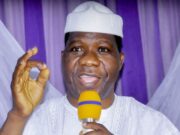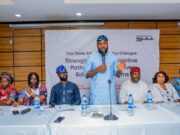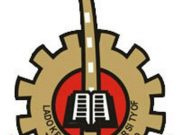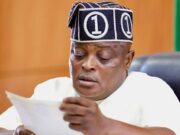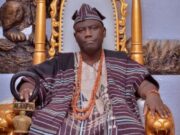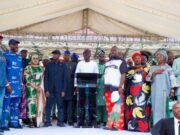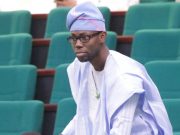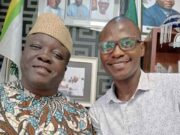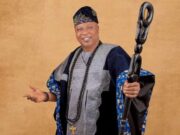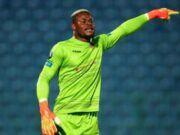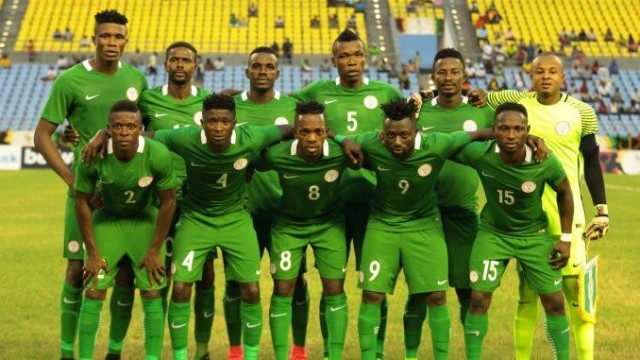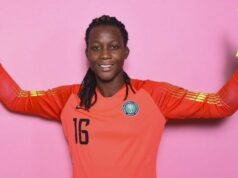Days after the final of the 2018 edition of the African Nations Championship in Morocco, the performance of Nigeria’ home-based Super Eagles is still being discussed and they have been rated low.
Initially, not many gave Nigeria a chance at the competition, which is meant exclusively for footballers playing in their country’s domestic leagues, but they surpassed expectations to reach the final of the competition.
Harsh working conditions in the domestic league, like unpaid salaries and allowances, poor pitches, insecurity at match venues, alleged poor officiating amongst others, had justified critics’ submission to write off the Eagles even before the tournament began.
After a widely-criticised goalless draw against Rwanda in their first match, a Sunday Faleye lone strike against Libya in their second match did little to calm frayed nerves of the team’s fans. But coming from a goal down to beat Equatorial Guinea 3-1 in their final group match gave a glimmer of hope to the Eagles’ followers and critics.
The team got criticised again after a Gabriel Okechukwu winner in extra time helped secured a 2-1 win over Angola in the quarter-final, in which the team squandered numerous scoring opportunities before falling behind by a goal to the Angolans.
Okechukwu again scored the winner in the 1-0 win over Sudan in the semi-final to help the team make history by surpassing their previous best finish at the tournament – a third-place finish in 2014. But the heroics of Plateau United goalkeeper Dele Ajiboye, who came on for injured captain Ikechukwu Ezenwa, which kept the marauding North Africans in check, ensured victory in the history-making match.
However, the home Eagles failed to fly in the final with their 4-0 scandalous defeat to hosts Morocco at the Stade Mohamed V, Casablanca. Goals from Zakaria Hadraf, Walid El-Karti and tournament Most Valuable Player and record scorer Ayoub El-Kaabi decimated a hapless 10-man Super Eagles in their first final since the competition debuted in 2009.
It was the second high-margin loss by the team in successive finals after they lost 4-1 to hosts Ghana in the final of the regional WAFU Cup in September 2017.
After their performance at the tournament, mixed reactions have greeted the team’s performance with several stakeholders giving various reasons for the team’s crumbling outing in Morocco.
According to reports, the Atlas Lions, whose team are mainly made up of players from the two top clubs in Casablanca – Wydad Athletic Club, who won the 2017 CAF Champions League, and Raja Casablanca – began preparations for the competition two years ago.
Ex-internationals, coaches and football administrators, who spoke with our correspondent, differed in opinions on the Eagles outing in Morocco. While some argued that the team was not the best the domestic league could offer for such a competition, others blamed the team’s inadequate preparations for their performance in Morocco.
A former Eagles coach, Adegboye Onigbinde, said the Eagles exhibited systemic problems, adding that the players in the team were not the best in the league.
The former FIFA instructor argued that the players, who went to Morocco, were not technically sound, saying there were better players in the league than those who played for the Eagles in CHAN. He said coaches in the domestic league needed to be trained to properly identify players for clubs and national teams.
Onigbinde, who coached the silver-winning Eagles at the 1984 African Cup of Nations in Cote d’Ivoire, stated, “The tournament has ended but there is a lot that needs to be learnt from the team’s performance at the competition. Although I will not want to be an arm-chair critic – judging the coaches from afar without having a good knowledge of the reason for their actions – I believe that a lot is wrong with the team.
“The players in that team are not the best the country’s league can offer. There are many better players than they are in the league. Some of them are already playing while some needs to be discovered. That team was filled with players whose agents want to expose to the clubs outside the country.”
He added, “We can blame the coach for failing to select the right players but how many of the country’s coaches will put together a team better than that? The problem is administrative and the earlier we return to correct it, the better for us.
“The coaches need to be trained for them to impart the proper knowledge into the players. Training the coaches will also help them to know what to look out for in players for their clubs and the national teams.”
On Thursday, CAF released the tournament’s Best 11 with defender Stephen Eze and midfielder Dayo Ojo making the team.
But former Technical Director of the Nigeria Football Association, Kashimawo Laloko, who hailed the two players, identified the team’s complacency for the heavy defeat they suffered in the final. He said the players did not reflect the status of the league, which he described as fast-improving.
He said, “I am not surprised that two of our players were named in the Best 11 of the tournament. Some of our players did well for themselves but their performance as a team left much to be desired.
“They were complacent in their final match against the Moroccans, which was why they lost heavily. The coach battled several forces such as injuries to some of his key players but the players failed to show any sense of urgency or cohesion in their play. They lacked coordination and failed to recover after they were reduced to 10-men – they fell apart from that point on.
“They were contented with making the final and the Moroccans, who had the support of their home crowd, showed they needed the title more than Nigeria. The team’s performance did not reflect the league in any way because the league is improving in many ways.
“Although there are many challenges facing it, an observer of the matches played every week will notice some improvement in the quality of play by the clubs. Nigeria needs to prepare adequately for tournaments to avoid such embarrassment.”
Premier League legend, Victor Ezeji, said the team’s performance reflected what the players had been used to in the domestic league.
Ezeji added, “In their first match against Rwanda, they were in all sorts and could hardly get themselves together to secure a win. They only fought to avoid a defeat in that game but in their subsequent matches, they exhibited the never-say-die spirit on the Nigerian teams and got back-to-back wins against Equatorial Guinea and Angola – even after going a goal down.
“But where their performance reflected their experience in the league was in the final match against Morocco. The players have been used to playing against home teams in the league, who will do everything possible to win in their backyards.
“That belief that they were playing against the home team affected their psyche and they gave their worst performance of the tournament.”
Ezeji argued that coach Salisu Yusuf’s decision to drop striker Anthony Okpotu for Peter Eneji in the starting line-up for the final also affected the team.
He said, “I believe the decision to bench Okpotu for Eneji in the final was a mistake from the coach. The team have been playing together in five matches. The introduction of a player, who is starting his first match of the tournament, really affected the team’s balance and eventually cost them when he was sent off in the second half.”
Credit: punchng.com








